KABUL, Afghanistan — Kabul is unlike any place I’ve ever been. The city is overflowing with people who have returned from refugee camps and who are now unafraid to walk the streets. There are many signs that show the number of organizations from all over the
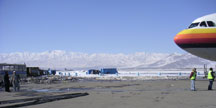 |
A view of the mountains from the airport. |
world that have come to Kabul to be a part of its rebuilding. The University of Nebraska at Omaha has a rich history in Kabul – dating back two decades. Because of the work of Tom Goutierre and the support of UNO, our representatives from UNMC are well placed to assist in the long-term recovery of this once beautiful city.
The city is now a mix of buildings being restored and those that have been reduced to rubble. The population of the city is about 3 million. This is especially surprising since pre-Russia and Taliban estimates of the city’s population were well below 1 million.
My heart is light as I go about this amazing place. Even though I see people who have been subjected to the worst assaults — physically and mentally — there is the spirit of hopefulness and a resilience of spirit that is a joy to behold. I feel proud that UNO and UNMC are a part of this great re-birth.
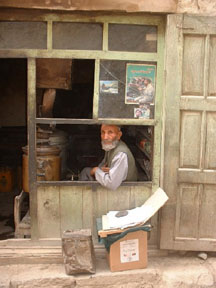 |
A man rests. |
According to our guide Yaseer, a native of Afghanistan, the number of cars on the streets has increased from 1,200 to nearly 100,000 over the past two years. Like any street with rapid growth, traffic is a significant problem. One-lane roads become two-lane roads and bicyclists and motorcyclists wind through the semi-aggressive drivers with seeming ease and a lack of concern about the consequences of metal meeting bone. In the midst of the traffic jam women and children approach cars to beg for money or industrious young men sell books on the history of the warlords of Afghanistan or a relatively new Newsweek magazine. The drive to one morning meeting took nearly an hour during the rush hour; the return trip took less than 10 minutes.
I do not have estimates of the percentage of people who live in poverty in Kabul but any is too much. The women who are widows and children who are orphans have to be very creative to eek out a living. Salaries can be quite low when compared to Western standards. For instance, a nurse may be paid $30 per month. This salary structure does not make the profession of nursing attractive. The most qualified of the Afghans frequently seek to work for foreign organizations or the United Nations. This creates a brain drain for the most needy of internal organizations.
At the UNO house, we are extremely fortunate to have the use of the administrator, drivers and housekeeping staff – an extremely competent group who seem to know our every need and help with everything from appointment-making to negotiation of baggage and customs at the airport. The UNO house itself is surrounded by a brick wall and has the 24-hour vigilance of guards, as is the custom for most expatriate organizations. Safety does not feel like an issue here. We move about without restriction, but with guidance from those who know the way of the city.
Dr. Ward Chambers has made astonishing progress in the area of medical assistance and medical education. During our trip, he met with Dr. Fayez of the Ministry of Health. Because of Dr. Chambers’ work over the past year and a half, he has demonstrated his commitment to improving the health of the people of Afghanistan. He has done that, first of all, by being here and, secondly, by bringing books and medical equipment to one hospital. He has been asked to be directly involved in a series of seminars and meetings reviewing the present and future of primary care, as well as participate in a comprehensive overview of the medical curriculum of the country. Because of the invasion of Russia from 1979 to 1989 and the subsequent rule of the Taliban, the once progressive Afghanistan came to a virtual halt. Curricula are at least 23 years old and have had no revisions during that time.
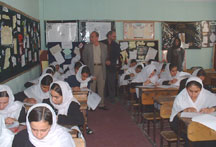 |
Women in Afghanistan are again allowed to participate in the educational process. |
The same is true of the nurses and allied health personnel. Women, under the Taliban, were not allowed to participate in educational opportunities. As a result, the ratio of females to males in health fields other than medicine declined sharply. In general, for the past 20 years, a nursing class might consist of 120 people — all males. The nurses also were taught by doctors and had a small role to play in health care — a sharp contrast to nursing as I know it. Here, nurses may be taught a significant amount of theory (though it is 20 years old), but they are not allowed/encouraged to have a real hands-on clinical experience. They may go to the hospital to observe, but will not participate in care-giving while they are learning the theoretical components. As such, the graduate nurse is poorly prepared to be more than a general assistant.
An important issue for nursing is the person’s education level. In order to work for the government, a minimum of 12 years of education is required. Many people in Afghanistan have 9 years of education (or much less), and this is particularly true of women. The need for women to go into midwifery and nursing is critical because of the nature of the society and the dire condition of maternal and child health. The infant mortality rate in Afghanistan is one of the highest in the world, as is the maternal death rate. Women need women to care for them before, during and after pregnancy, and much is needed to help the nurses assist in improving health.
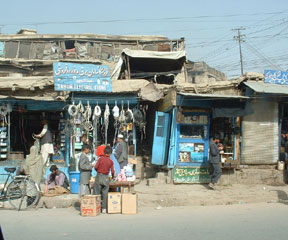 |
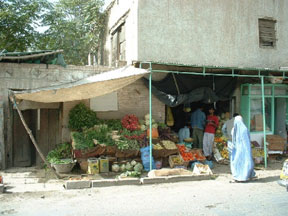 |
Two stores in Kabul. |
On the day we arrived in Kabul, Dr. Sheila Ryan and Dr. Rosaline Olade of the UNMC College of Nursing met with Yasmin Amarsi, Ph.D., professor and dean of the School of Nursing at the Aga Khan University, and with Rukshana Rahmetulla of the Institution of Health Sciences, to discuss the needs of nurses in Afghanistan. On the following day, the group met with Dr. Polpaul, head of the Institution of Health Sciences, and Roya Sadrizadch, the representative from World Health Organization. As it happens, Dr. Popauls’s uncle graduated from UNL with a degree in agriculture.
Most importantly during the discussions, the Afghan team members emphasized the importance of meeting them where they are, i.e. to give assistance that was both desired and at the proper level of understanding and need for the people in Afghanistan. That was where I came in – explaining the philosophy of the UNMC team to be cognizant and respectful of the needs of the future partners, not just impose our pre-set thoughts and ideologies. The proliferation of “helping” organizations has made the Afghans understandably direct about the issue of partnerships and collaborations.
In general, the meetings went smoothly. All of the Afghan nurses we talked with had an exceptional command of English so communication was not an issue. Only once was an interpreter used and that was to be sure that no nuances were missed or misunderstood.
The greatest needs in nursing, as in most of the health sectors, were to review and upgrade curricula, develop standards of practice, and develop capacity – both human and financial — to improve the profession of nursing and ultimately, improve the care of the Afghan people.
There were frequent and sincere discussions about the need to make up for the extreme oppression of women under the Taliban. Every organization expressed a desire to ensure that women are always thought of when improving most aspects of the educational arena. While there are still women who wear chadris, whether because of a
personal preference to be completely covered or the fear of reprisals should the Taliban regain power, the majority of women wore scarves or no head covering. Modesty was still the order of the day as no skin was exposed. It was the norm to see women in loose-fitting pants or long skirts.
I never saw a woman drive and there were only rare times when I saw women in the street. Women who were involved in the meetings we attended were respected as true team members and the personality of the ones we met were all type-A but with extreme courtesy as an overlay. So far, the women making the health care decisions have been educated in the United States, Canada, and Pakistan. The Dean of the Aga Khan University School of Nursing earned a graduate degree at the University of Arizona and the principal player in HIS received her advanced practice nursing degree from Case Western.
During our trip, we took a quick tour around Kabul, where there is only one public swimming pool – and of course, it is for men only.
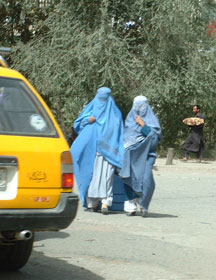 |
While some women still were chadris, most now wear scarves or no head covering. |
Chicken Street is a street where there is lots of shopping. One of the many things to be
seen is meat – hanging from hooks, out in the air – waiting to be sold. Unlike Cairo, there are no flies obscuring the view. There are many people here without electricity, running water or other things we take for granted. Many times meat is cured using salt so it will keep for long periods.
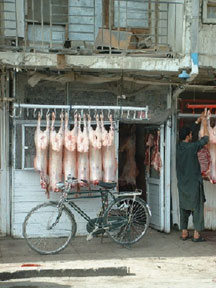 |
Meat hangs on hooks outside of the stores in Kabul. |
Schools in Kabul go in three shifts because there are not enough teachers or enough classrooms intact. It also is a means of not having to feed the children – too much in the way of logistics in the midst of getting the next group. Schools, many of them, do not have heat so the long school break is during the winter. There is also a two-week break once or twice in the summer to accommodate un-air-conditioned buildings in a place where the average temperature may be 110 degrees F.
Most people still have meals in a room with cushions over carpet and the meal is taken by sitting cross-legged on the floor. The women cook the food but women and children do not join the formal dinner. I was considered a special guest so an exception was made. The meal begins with the children bringing around an ornate siver pitcher and matching bowl. Water is poured over each guest’s hand and the guest washes over the bowl. A cloth towel is given to dry the hands.
Sometimes tea is served before the meal. There is always naan – a local bread that is made by sticking dough to the sides of very hot earthen ovens. Typically there is rice, vegetables and meat. Fruit is usually served rather than dessert but there are always small sweet candies or candy-coated almonds or dried grapes available. For this special meal pomegranates were served. They are tricky to eat and leave a permanent red stain, but are so sweet and delectable, it’s well worth the trouble. Tea is served as the dishes are cleared.
After the meal, the washing ritual is repeated and, at that time, the men went to pray while I sat with a pleased and satiated look. I have never had better food — much to the regret of my waistline but, c’est la vie, there’s always a treadmill waiting for me on the other side of the world.